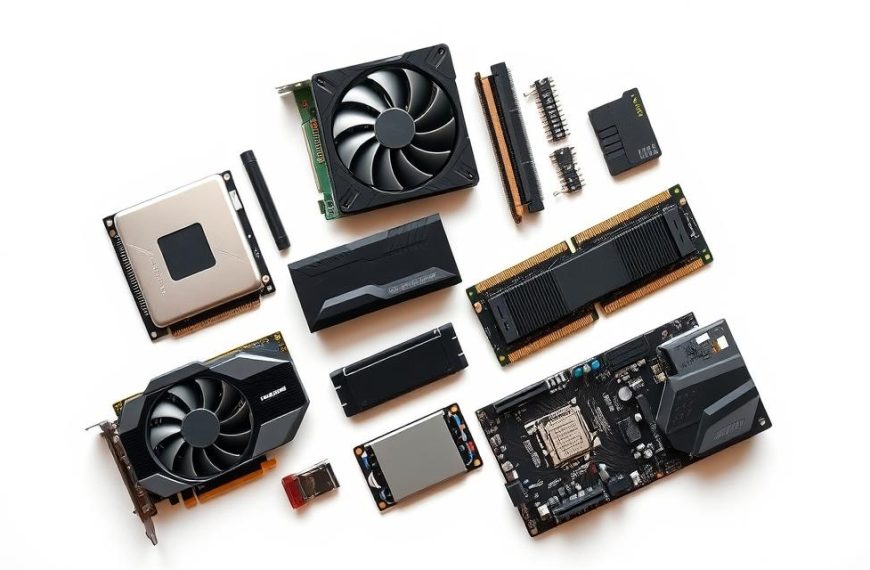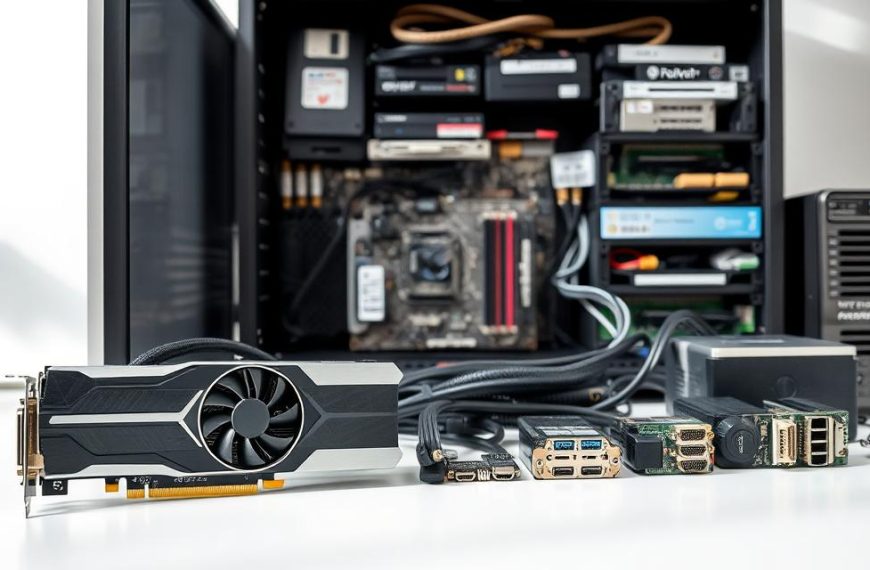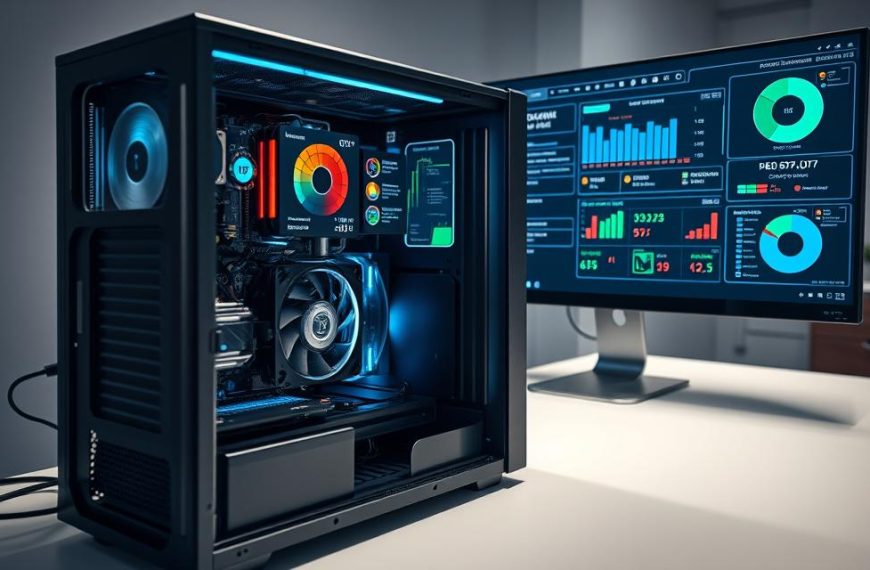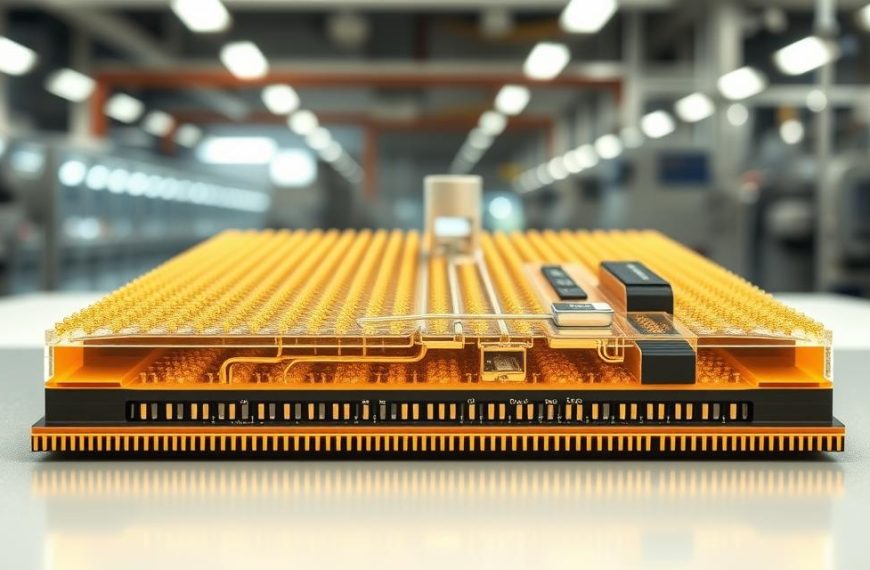Computer hardware engineering is an exciting career for tech enthusiasts. These professionals design, develop, and test the physical components of our digital world1. They create innovative computing systems that drive technological progress.
This career demands specialised skills and thorough education. Most hardware engineers have a Bachelor’s degree, while some pursue advanced qualifications1. They typically study computer or electrical engineering programmes.
Proficiency in programming languages like C, C++, and Verilog is crucial for success1. Over 70% of employers prefer candidates with internship experience, making practical skills vital1.
The job outlook for hardware engineers is promising. From 2022 to 2032, a 5% growth is expected in this field1. The median annual wage is an impressive $128,1701.
Continuous learning is key in hardware engineering. Engineers often spend about 10 hours monthly on skill development1. Notably, 85% report high job satisfaction, indicating a fulfilling career path1.
Understanding the Role of Computer Hardware Engineering
Computer hardware engineering drives technological innovation. These engineers design, develop, and maintain the physical components powering our digital world2.
Hardware engineers face complex challenges in the ever-changing tech landscape. They need technical expertise and creative problem-solving skills to excel in their roles.
These professionals must blend technical know-how with innovative thinking. Their work shapes the future of computing and digital devices.
Core Responsibilities and Daily Tasks
Hardware engineers tackle various activities in their computer engineering work environment:
- Designing and prototyping computer components
- Testing hardware for performance and reliability
- Developing specifications for new hardware systems
- Collaborating with software engineers to ensure system compatibility
Work Environment and Industry Settings
Hardware engineers work in diverse professional settings. Here’s where they typically find employment:
| Industry Sector | Percentage of Employment |
|---|---|
| Research and Development | 20% |
| Semiconductor Manufacturing | 16% |
| Computer Systems Design | 15% |
| Computer Equipment Manufacturing | 8% |
| Federal Government | 7% |
History and Evolution of Hardware Engineering
Hardware engineering emerged in the 1940s and 1950s, alongside rapid computing advancements. Engineers have driven progress from massive mainframes to today’s powerful, compact devices3.
The field offers exciting opportunities for aspiring professionals. It boasts 4,600 annual job openings and 5% projected growth from 2022 to 20322.
Essential Skills and Qualifications
Computer hardware engineering requires a mix of technical and people skills. Professionals must develop comprehensive hardware engineering skills to thrive in the tech world4.
The essential computer hardware qualifications include a wide range of skills. These go beyond just technical know-how.
- Technical Proficiencies
- Advanced computer-aided design (CAD) software expertise
- Programming languages (C, C++, Python)
- Circuit design and analysis
- Operating system comprehension
- Analytical Capabilities
- Critical problem-solving skills
- Systematic analytical thinking
- Innovative design approaches
Most jobs need a bachelor’s degree in electrical or computer engineering4. Staying up-to-date with new tech is crucial5.
| Skill Category | Key Components | Importance Level |
|---|---|---|
| Technical Skills | CAD Proficiency | High |
| Soft Skills | Communication | Critical |
| Analytical Skills | Problem-solving | Essential |
A strong skill set helps hardware engineers tackle complex tech issues. It allows them to create innovative engineering solutions5.
How to be a computer hardware engineer?
Becoming a computer hardware engineer requires careful planning and preparation. It involves building a strong educational base, getting professional certifications, and gaining hands-on experience.
Required Educational Background
A solid hardware engineering education is vital for aspiring professionals. Most employers look for candidates with a bachelor’s degree in computer or electrical engineering.
About 48% of computer hardware engineering jobs need a bachelor’s degree. Another 34% require a master’s degree6.
- Bachelor’s degree programmes in computer engineering
- Electrical engineering specialisations
- Technical computing disciplines
Professional Certifications and Credentials
Computer hardware certifications can boost career prospects. Professionals can earn credentials that prove their technical skills. Key certifications include:
- CompTIA A+ Certification
- Cisco Network Certifications
- IEEE Professional Certifications
The IEEE, with over 460,000 members worldwide7, offers many professional growth opportunities. Most advanced certifications require at least two years of experience6.
Gaining Practical Experience
Practical experience is crucial in hardware engineering. Most internships last at least two months and often occur during summer breaks7.
Entry-level jobs provide vital hands-on learning chances. The average starting salary is around £60,0008.
Continuous learning and practical application are the cornerstones of a successful hardware engineering career.
Budding engineers should look for opportunities through:
- University internship programmes
- Research assistantships
- Entry-level engineering roles
The Society of Women Engineers, with over 40,000 members, supports diversity in the field7.
Career Development and Growth Opportunities
Planning a hardware engineering career path requires strategic thinking and ongoing professional growth. Computer hardware experts have many options for development and specialisation. Engineers can climb from entry-level jobs to advanced roles by improving skills and making smart moves.
Career advancement opportunities include several exciting paths:
- Senior Hardware Engineer
- Engineering Manager
- IT Operations Manager
- Director of Hardware Engineering
- Product Management roles
Professionals can boost their career prospects by using smart development approaches. Continuous learning is vital in this ever-changing field9. Most experts believe a clear career plan increases the chances of achieving goals.
Key strategies for career progression include:
- Obtaining additional certifications9
- Networking with industry professionals9
- Pursuing advanced educational qualifications10
- Staying updated with emerging technologies
The growth potential is impressive, with experienced engineers earning median annual wages of £132,00010. Job prospects look bright, with a 5% increase expected in hardware engineering roles by 203210.
Strategic career planning transforms technical expertise into leadership opportunities.
Salary Expectations and Job Market Outlook
The UK computer hardware job market offers promising financial prospects for skilled professionals. Understanding the salary landscape is crucial for hardware engineers exploring career opportunities.
Hardware engineer salaries in the UK vary based on experience, location, and specialisation. Professionals can expect competitive compensation that reflects their technical expertise and industry demand11.
Salary Ranges by Experience
Career progression directly impacts earning potential for hardware engineers:
- Entry-Level (1-4 years): £82,250
- Mid-Career (5-9 years): £95,000
- Late Career (10-19 years): £102,00011
Regional Salary Variations
Geographical location plays a significant role in determining hardware engineer salaries. Tech hubs typically offer higher compensation compared to smaller regional markets12:
- London: Highest concentration of tech opportunities
- Cambridge: Strong research and development sector
- Manchester: Growing technology ecosystem
Industry-Specific Compensation
Different sectors provide varying compensation packages for hardware engineers11:
- Research and Development: 35% of employment
- Computer Manufacturing: 25% of roles
- Engineering Services: 20% of positions
- Government Sectors: 10% of opportunities11
Continuous skill development can increase earning potential by 20-30% through additional certifications11.
Hardware engineering remains a stable and attractive career path in the UK. The job market is projected to grow by 4.5% from 2022 to 203212.
Conclusion
Computer hardware engineering offers an exciting career in technological innovation. Starting salaries range from $65,000 to $70,000, with experienced professionals earning up to $200,000 annually13. Successful engineers know that continuous learning is crucial in this dynamic industry14.
The future of hardware engineering requires adaptable professionals passionate about technological progress. Emerging fields like IoT present opportunities across diverse sectors, including telecommunications and aerospace14. Strong analytical and problem-solving skills are essential for engineers to lead technological advancements.
For aspiring hardware engineers, the path is clear. Build a solid educational foundation and gain practical experience through internships14. The industry values curiosity, creativity, and up-to-date technical expertise.
Experienced professionals may advance to project management or executive roles in technology companies14. Aspiring engineers can find career guidance through professional development platforms. The future is bright for those ready to tackle challenges in this evolving field.
FAQ
What does a computer hardware engineer actually do?
What educational qualifications are required to become a hardware engineer?
What programming languages are most important for hardware engineers?
How competitive is the job market for hardware engineers in the UK?
What professional certifications can enhance a hardware engineer’s career?
What is the typical salary range for hardware engineers in the UK?
What soft skills are crucial for success in hardware engineering?
How quickly is hardware engineering technology evolving?
Are internships important for aspiring hardware engineers?
What industries employ computer hardware engineers?
Source Links
- https://www.careerexplorer.com/careers/computer-hardware-engineer/how-to-become/
- https://www.coursera.org/articles/hardware-engineer
- https://www.uopeople.edu/blog/computer-hardware-engineer/
- https://workbred.co.uk/career/hardware-engineer
- https://www.computerscience.org/careers/computer-hardware-engineer/
- https://www.computerscience.org/careers/computer-hardware-engineer/how-to-become/
- https://www.bestcolleges.com/computer-science/how-to-become-computer-hardware-engineer/
- https://www.wgu.edu/career-guide/information-technology/hardware-engineer-career.html
- https://www.linkedin.com/advice/1/how-can-you-create-career-development-plan-hardware-ycygf
- https://www.itcareerfinder.com/it-careers/computer-hardware-engineer.html
- https://computerhardwareguide.co.uk/how-to-become-a-computer-hardware-engineer-skills-education-career-path/
- https://www.careerexplorer.com/careers/computer-hardware-engineer/job-market/
- https://www.fieldengineer.com/skills/computer-hardware-engineer
- https://www.ituonline.com/blogs/computer-hardware-engineer-education/












